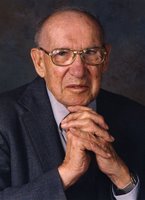
It is difficult to overestimate the significance of Peter Drucker. He was the pre-eminent management guru of the last century. Along with countless thousands of others, my first assignment in a secular business school involved reading one of Peter Drucker's many tomes. But, less noticed by some of his business associates was the fact that he was also a faithful Christian servant with a commitment to Christ's church.
A list of his most notable proteges includes titans of ministry as well as management such as: Rick Warren, Bob Buford, Ken Blanchard, Bill Hybels, and Peter Senge. During his later years he became quite interested in the non-profit sector and devoted much of his time to Christian organizations, including churches.
Peter Drucker said the pastoral church is essential to society because it offers three ingredients necessary for our new century
1. BELONGING, for people need community.
2. MEANING, to interpret our knowledge.
3. PASTORAL CARE, for many people hurt.
Peter Ferdinand Drucker (November 19, 1909 – November 11, 2005) was a management theorist who created many phrases common in business today.
Drucker, born in Vienna, Austria, fled from the Nazis to the United States in 1937. In 1943, he became a naturalized citizen of the United States. He taught at New York University as Professor of Management from 1950 to 1971. From 1971 to his death he was the Clarke
Professor of Social Science and Management at Claremont Graduate University.
He wrote thirty nine books, the first in 1939, and from 1975 to 1995 was an editorial columnist for The Wall Street Journal, and was a frequent contributor to Harvard Business Review. He continued to act as a consultant to businesses and non-profit organizations when he was in his nineties.
Several ideas run through most of Drucker's writings:
* profound skepticism about macroeconomic theory. Drucker contended that economists of all schools fail to explain significant aspects of modern economies.
* A desire to make everything as simple as possible. According to Drucker, corporations tend to produce too many products, to hire employees they don't need (the better solution is contracting out), and to expand into economic sectors that they should stay out of.
* A belief in what he called "the sickness of government." Drucker made ostensibly non-ideological claims that government is unable or unwilling to provide new services that people need or want - though he seemed to believe that this condition is not inherent to democracy. Even successful programs, such as US Social Security, long ago ceased to be interesting to an increasingly alienated citizenry.
* The need for "planned abandonment." Corporations as well as governments have a natural human tendency to cling to "yesterday's successes" rather than seeing when they are no longer useful.
* The lasting contribution of the "father of scientific management", Frederick Winslow Taylor. Although Drucker had little experience with the analysis of blue-collar work (he spent his career analyzing managerial work), he credited Taylor with originating the seminally important idea that work can be broken down, analyzed, and improved.
* The need for community. Early in his career, Drucker predicted the "end of economic man" and advocated the creation of a "plant community" where individuals' social needs could be met. He later admitted that the plant community never materialized, and by the 1980s, suggested that volunteering in the non-profit sector might be the key to community.
Drucker was awarded the Presidential Medal of Freedom by U.S. President George W. Bush on July 9, 2002. He was the Honorary Chairman of the Peter F. Drucker Foundation for Nonprofit Management, now the Leader to Leader Institute, from 1990 through 2002. His most controversial work was on compensation schemes, in which he said that senior management should not be compensated more than twenty times the lowest paid employees. This made him an enemy of some of the same people who had previously praised him.
Drucker died November 11, 2005 in California of natural causes. He was 95.
Today's blog was completed with the assistance of beaconchurches.net (http://beaconchurches.net) and the good work of the people at Wikipedia (http://en.wikipedia.org/wiki/)

No comments:
Post a Comment